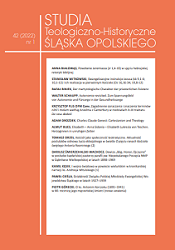Dewiza „Bóg, Honor, Ojczyzna” w posłudze kapłańskiej pasterzy parafii pw. Niepokalanego Poczęcia NMP w Dąbrówce Wielkopolskiej w latach 1898–1969
The Motto “God, Honour, Homeland” in the Priestly Service of the Parish of the Immaculate Conception of the Blessed Virgin Mary Parish in Dąbrówka Wielkopolska in the Years 1898–1969
Author(s): Dariusz Śmierzchalski-WachoczSubject(s): Christian Theology and Religion, Recent History (1900 till today), Politics and religion, 19th Century
Published by: Uniwersytet Opolski
Keywords: clergy; autochthones; borderlands; Germanisation; Dąbrówka Wielka (Wielkopolska);
Summary/Abstract: In the history of Poland, the motto of the Polish Army “God, honor, fatherland” also applied to the ordinary attitude of citizens. Especially in the case of clergymen whose membership in this state did not preclude military service. An example is the village of Dąbrówka Wielkopolska lying within the borders of the Babimost region and since the dawn of history it was part of the territory of the Polish state. In the second half of the 19th century, the colonization action of Prussia intensified and another attempt at Germanization of the Babimost region turns into an open fight for the land. In 1919, the Babimost region is overwhelmed by the wave of the Greater Poland Uprising. Residents take up arms. Unfortunately, as a result of the Treaty of Versailles, these areas remain within the borders of Germany. In the interwar period, the population of the Babimost region continued to resist. During the war years, they pay for it with blood and martyrdom. After World War II, the Babimost region returned to the borders of the Polish state. Catholic priests working in the parish of Dąbrówka Wielkopolska made a great contribution to the work of defending Polish national identity. At the turn of the 19th and 20th centuries, they entered the history of this town with golden letters: Fr. Józef Braun (1898–1923), Fr. Leon Binder (1923–1952) and Fr. Bernard Witucki (1952–1969). German priests who replaced Fr. Binder during World War II, when he was in a concentration camp. Fr. Leon Koplin and Fr. Klemens Weilandt were able to stand above national divisions, remaining shepherds for the Polish population in Dąbrówka Wlkp.
Journal: Studia Teologiczno-Historyczne Śląska Opolskiego
- Issue Year: 42/2022
- Issue No: 1
- Page Range: 167-192
- Page Count: 26
- Language: Polish

